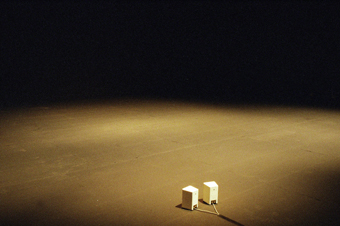David Weber-Krebs: More than it says it is…
Ruth Holdsworth

David Weber-Krebs, This performance
This Performance says it is about to do a lot of things. At first you think these are empty promises. Nothing more than the voice announcing supposed action is projected towards the theatre’s back wall from 2 small speakers lit by a spotlight suspended from the rigging. The theatre is otherwise exposed, naked beneath its own stage lights. We see every scuff mark and the pile of old props stacked high in the open wings.
This performance says it is about to create many things—including “pretensions”—which it very nearly does. David Weber-Krebs has enjoyed toying with this fine line between academic masturbation and true insight. His work is a parody of parody. This Performance, in which he doesn’t appear, is a highly self-reflective being—its own director, performer, dramaturg, technical crew and theorist.
It evolves, and starts its life cycle as an optimist; it is young and full of the excitement of possibility of what it can deliver as a performance. It promises to “recalculate risk” even, but then later realises that this is a fait d’accompli and that what it offers is laced with the wisdom that it might “develop a language of failure…increase boredom drastically…get weaker.” It fleetingly thinks it can seduce death, but then accepts and celebrates its own inevitable mortality.
This Performance reaches out to its audience, and seems to know that it can test them. We are, after all, at a festival of Live Art, ‘hybrid’ performance and “intrigue” which, (in the words of Inbetween Time’s Artistic Director, Helen Cole), might reject “conventional art spaces or places” and remain “playfully anarchic.”
After a time, I started feeling that these may not be empty statements of intent. I began to read into this performance all the things that it said it was about. I was “affected gradually”, just like the water dripping slowly from the rig, forming a small pool of water that turned to a rivulet and made its way across the empty floor. Simultaneously, water trickled like piss down the theatre’s pillars.
This Performance reminded me of so many companies, most obviously Forced Entertainment’s stripping down and deconstruction of theatre but, in particular, the Italian group Societas Raffaello Sanzio who frequently use light and sound to replace material presences on stage.
Light switched from spot to spot, falling on water in the far corner of the stage. A chink appeared to open in “the stage curtain”, letting a shaft of light fall, illuminating a sliver of dust-like water particles that came to rest on the theatre’s walls. Realism exposed theatrical illusion when a final ‘prop’, a female actor (older and perhaps therefore wiser), entered through a door at the back of the stage. She purposively declined to meet our expectant gaze. Our relief at the appearance of an actor whose utterances could emanate from a real voicebox was short-lived. She moved centre, stopped and started to ‘fit’ wildly, ending up lying face up in the water—a fake, iconic representation of the “actor.”
After a performance initially empty of theatrical conventions (props, actors, set), a performer, light and sound gave us, the audience, a more readily distinguishable performance, yet it is hard to discern which is the more authentic for David Weber-Krebs.






